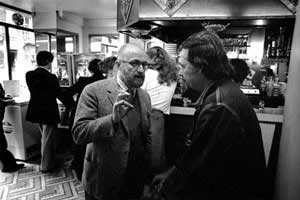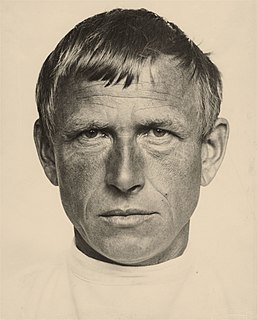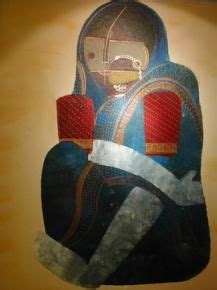A Quote by Pierre Alechinsky
When a painter thinks to disengage from the world outside himself and fantasies unprecedented forms he thinks he will make a painting, he finds in this expression the same effect - I would even say the same picture - that he had unconsciously acquired by his habit to experience reality intensely.
Related Quotes
We forget that, although freedom of speech constitutes an important victory in the battle against old restraints, modern man is in a position where much of what "he" thinks and says are the things that everybody else thinks and says; that he has not acquired the ability to think originally - that is, for himself - which alone gives meaning to his claim that nobody can interfere with the expression of his thoughts.
A cat actually thinks visibly. If you watch him jump on a shelf, the wish to jump and the action of jumping are one and the same thing... It's in exactly the same way that all Brook's exercises try to train the actor. The actor is trained to become so organically related within himself, he thinks completely with his body. He becomes one sensitive, responding whole... The whole of him is one.
Freedom of Will-that is the expression for the complex state of delight of the person exercising volition, who commands and at the same time identifies himself with the executor of the order-who, as such, enjoys also the triumph over obstacles, but thinks within himself that it was really his own will that overcame them. In this way the person exercising volition adds the feelings of delight of his successful executive instruments, the useful underwills or under-souls-indeed, our body is but a social structure composed of many souls-to his feelings of delight as commander.
Leon Golub was a painter. He was an artist struggling to make it in the New York City art world, but at the same time he was a very political guy, and engaged in the world around him. In the film, we saw how that world eventually encroached into his painting. One of my favorite lines in the film was how he had to be more precise, 'but now the pants have wrinkles, I hated to do it, but I had to do it.'
If you punish a child for being naughty, and reward him for being good, he will do right merely for the sake of the reward; and when he goes out into the world and finds that goodness is not always rewarded, nor wickedness always punished, he will grow into a man who only thinks about how he may get on in the world, and does right or wrong according as he finds advantage to himself.
Man tries to make for himself in the fashion that suits him best a simplified and intelligible picture of the world; he then tries to some extent to substitute this cosmos of his for the world of experience, and thus to overcome it. This is what the painter, the poet, the speculative philosopher, and the natural scientists do, each in his own fashion. Each makes this cosmos and its construction the pivot of his emotional life, in order to find in this way peace and security which he can not find in the narrow whirlpool of personal experience.
Neither is there figurative and non-figurative art. All things appear to us in the shape of forms. Even in metaphysics ideas are expressed by forms. Well then, think how absurd it would be to think of painting without the imagery of forms. A figure, an object, a circle, are forms; they affect us more or less intensely.







































